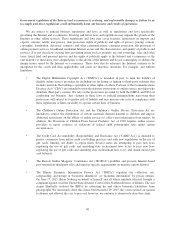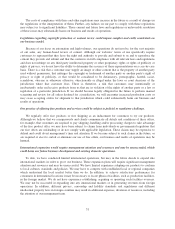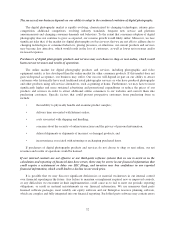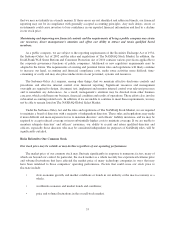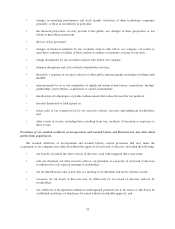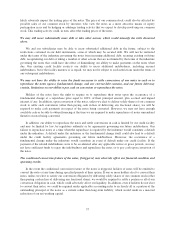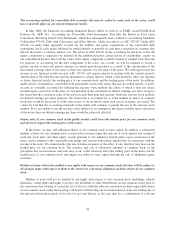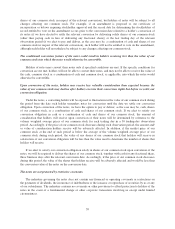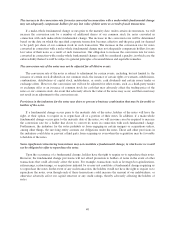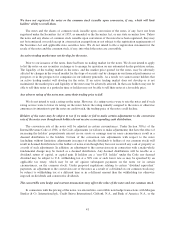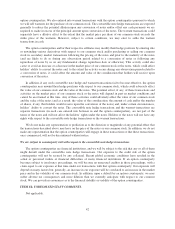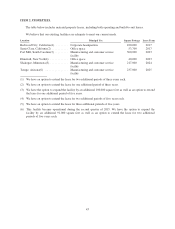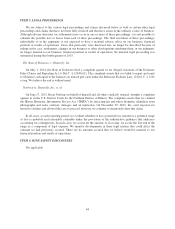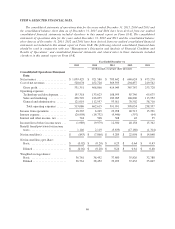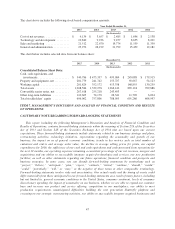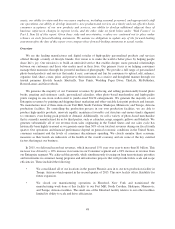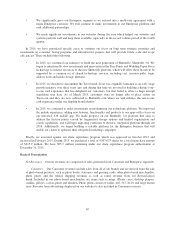Shutterfly 2015 Annual Report Download - page 42
Download and view the complete annual report
Please find page 42 of the 2015 Shutterfly annual report below. You can navigate through the pages in the report by either clicking on the pages listed below, or by using the keyword search tool below to find specific information within the annual report.The increase in the conversion rate for notes converted in connection with a make-whole fundamental change
may not adequately compensate holders for any lost value of their notes as a result of such transaction.
If a make-whole fundamental change occurs prior to the maturity date, under certain circumstances, we will
increase the conversion rate by a number of additional shares of our common stock for notes converted in
connection with such make-whole fundamental change. The increase in the conversion rate will be determined
based on the date on which the specified corporate transaction becomes effective and the price paid (or deemed
to be paid) per share of our common stock in such transaction. The increase in the conversion rate for notes
converted in connection with a make-whole fundamental change may not adequately compensate holders for any
lost value of their notes as a result of such transaction. Our obligation to increase the conversion rate for notes
converted in connection with a make-whole fundamental change could be considered a penalty, in which case the
enforceability thereof would be subject to general principles of reasonableness and equitable remedies.
The conversion rate of the notes may not be adjusted for all dilutive events.
The conversion rate of the notes is subject to adjustment for certain events, including, but not limited to, the
issuance of certain stock dividends on our common stock, the issuance of certain rights or warrants, subdivisions,
combinations, distributions of capital stock, indebtedness, or assets, cash dividends and certain issuer tender or
exchange offers. However, the conversion rate will not be adjusted for other events, such as a third-party tender
or exchange offer or an issuance of common stock for cash that may adversely affect the trading price of the
notes or our common stock. An event that adversely affects the value of the notes may occur, and that event may
not result in an adjustment to the conversion rate.
Provisions in the indenture for the notes may deter or prevent a business combination that may be favorable to
holders of the notes.
If a fundamental change occurs prior to the maturity date of the notes, holders of the notes will have the
right, at their option, to require us to repurchase all or a portion of their notes. In addition, if a make-whole
fundamental change occurs prior to the maturity date of the notes, we will in some cases be required to increase
the conversion rate for a holder that elects to convert its notes in connection with such fundamental change.
Furthermore, the indenture for the notes prohibits us from engaging in certain mergers or acquisitions unless,
among other things, the surviving entity assumes our obligations under the notes. These and other provisions in
the indenture could deter or prevent a third party from acquiring us even when the acquisition may be favorable
to holders of the notes.
Some significant restructuring transactions may not constitute a fundamental change, in which case we would
not be obligated to offer to repurchase the notes.
Upon the occurrence of a fundamental change, holders have the right to require us to repurchase their notes.
However, the fundamental change provisions will not afford protection to holders of notes in the event of other
transactions that could adversely affect the notes. For example, transactions such as leveraged recapitalizations,
refinancings, restructurings, or acquisitions initiated by us may not constitute a fundamental change requiring us
to repurchase the notes. In the event of any such transaction, the holders would not have the right to require us to
repurchase the notes, even though each of these transactions could increase the amount of our indebtedness, or
otherwise adversely affect our capital structure or any credit ratings, thereby adversely affecting the holders of
notes.
40


